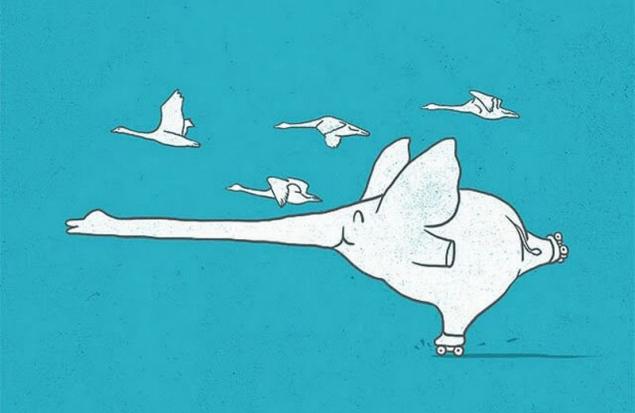460
11 arguments in favor of optimism
Would you consider yourself an optimist or a pessimist? Tal Ben-Shahar in his book "What will you choose?" believes that it is simply a matter of conscious daily choice. People can choose how to think and what to feel.

© Lim Heng Swee.
1. A self-fulfilling prophecy.
Optimists see the future bright and rosy and indulge in sky-high dreams. And their dreams are often a self-fulfilling prophecy: after a while they become a reality. Pessimistic view, on the contrary, increases the chances that the future will be bleak. Look full of expectations, promotes success and prosperity.
Focus on the positive does not mean that the person is divorced from reality and oblivious to the problems and difficulties that exist in everyone's life. On the contrary, it just shows the realistic view of the world — that it is important not to ignore the positive things that are as much a part of reality as negative.
2. To be optimistic means to see the beauty and charm
What we see around us depends on the choices we make. How often do we find time to peer out at the surrounding things and see their beauty, Comedy, mystery and charm? On the way to work whether we look aimlessly out the window, looking at the shape of the clouds, paint the sky? Are we able to see a cute dog and you smile or good deed of some man to praise him?
Following the usual route, it is natural to be lost in thought or absent-mindedly to watch nowhere. But the more deliberately and carefully we approach what we do here and now, the healthier and happier you become.
3. Optimists know how to forgive
Optimists are able to easily and quickly get rid of resentment, from this unnecessary burden, which presses on the back.
In Sanskrit, to forgive means "to loose, untie". When we forgive an offense, we untie an emotional knot and are plumbing a clog in the system of our emotions. We let the stream of emotions flow freely, can afford to feel anger, frustration, fear, pain, compassion and joy. To cherish his resentment is akin to tightening the knots — the more you pull, the tighter they are. Letting go of the situation, you will ease tension, and the knot is easier to untie. Forgive grudges and continue to move forward with ease, peace and happiness.
4. Optimists appreciate even those people that they don't like
If you try to understand where does our rejection of another person, you can tell a lot in itself. As a rule, we hate what we don't like about yourself. Learning to appreciate people that annoy us, we develop the ability to find something useful and empathize. You have people, which is particularly upsetting you? Are you annoyed some specific trait or a specific behavior? Try to hold the meditation of loving-kindness, experience positive emotions towards this man.
Meditation "loving-kindness" — a practice which exists in the East for thousands of years. It is based on a simple idea — to send kindness, compassion, generosity, kindness and positive emotions in themselves and other people. The research was conducted, in which subjects practiced loving kindness meditation for twenty minutes every day. The effect was striking: the subjects decreased the level of anxiety and depression, increased General feeling of joy and happiness, improved physical health, relationships, and level of motivation.
5. Optimists don't engage in negative internal dialogue and remember where their true "I"
In our head flows an endless stream of thoughts, and many of them contain a negative connotation, which can cause us harm. Sometimes we live with this malicious message for so long that we begin to confuse it with reality and act as if this negativity is the truth.
Optimists understand that, in most cases, negative attitudes have no reason and no common sense. They know when to stop the endless scrolling of these "voice messages" in your brain. Regain power over the inner voice on which pointer you live.
6. The optimist is on the bright side of life
Henry David Thoreau said: "Anyone who's looking for flaws, will find them in Paradise." The pessimist always seeks out problems and flaws in people and situations. And, of course, always finds: he finds fly in the ointment even ointment. The optimist sees the gap in the dark clouds, makes delicious lemonade of lemons and is on the bright side of life — and, by the way, don't blame the writers for using a hackneyed cliche! To find something good in every situation and in every person. And choosing to be an optimist or a pessimist — has a tremendous impact on your physical and mental health.
7. Optimism has a positive effect on health
Psychologists use the term "cognitive reconstruction" to describe our ability to assess the situation from different points of view. In difficult times and under difficult circumstances, sometimes it is useful to look at the situation from a different angle, for example to see the funny and lighter side of their problems. Of course, in some cases, the appropriate restraint and solemnity, but more often we treat ourselves and life too seriously, missing all the comical and funny.
Today, many studies prove that laughter can ease the pain and strengthen the immune system. This is the opening used for the treatment of patients patch Adams, and many other people around the world. But you need not wait for illness to bring more laughter into your life and enjoy the happiness, stronger relationships, and good health. Add to your everyday bit of levity: watch favorite shows, read jokes, socialize with friends who make you laugh.
8. Optimism helps to perceive difficulty as a challenge and not as a threat
Our lives are not free from sorrow and suffering. Even the happiest person in the world experiencing sadness, disappointment, anger, and grief. The difference between optimists and pessimists in relation to these emotions and interpreting emotions. Assessing the situation as a threat or as something eternal, you are surely going to experience stress. If you look at the same situation as a challenge, you will experience at the same time, probably just excitement, excitement. The optimist is the setting: I am the Creator of your experience, your life. Our perspective can radically change the experience that we receive as a result.
In one study, two groups of students were given the same math test. The first group said that the task called "difficult math", and they were instructed to solve it quickly and efficiently. The second group said that "math" is just an interesting and complex issue and that students should try to solve it. Unlike the first group, the second took the test as a fun challenge. These students reacted to the job calmer, more creative and in the end showed better results than the members of the first group that evaluated the same situation as a threat.
9. Optimists can improve your mood at any moment
Mind and body are interrelated. Acting on the body, we vozdeistviem the thoughts and feelings that, in turn, affect our physiological responses. Research "hypothesis facial feedback" showed that the expression of our face determines our mood: smile evokes positive emotions, while the frowny face makes us feel worse.
You can improve your mood almost any time: just smile or, even better, raidmates.
10. Gratitude — a tool for self-development optimists
Psychological studies have repeatedly proven that when something good happens and we accept it with gratitude, a number of positives in our lives is increasing. And when we do not appreciate good and take it for granted, it depreciates. The feeling of gratitude encourages personal growth and improved quality of life.
Psychologists asked participants in his study every day to write at least five events for which they were grateful. These looked quite simple pleasures, and fleeting experiences: from playing with the child to meet the dawn. In the results, the psychologists found that just one minute a day is given to the expression of gratitude, improves overall quality of life and increases the amount of positive emotions. Start a "gratitude journal" and every day before bed write down five things for which you want to be grateful for.
11. Optimists improve their lives through play
In childhood we play games, but when you "grow up", stop doing it. At any age, the game contributes to our psychological and physical well-being: the ability to play makes us more resilient, strengthens the immune system, increases creativity and improves relationships.
Not necessary to put a restriction: only play in leisure time or favorite activities, that is, only after the end of the day. You can take a decision and create a game atmosphere during dinner with family or a trip with friends, learning new skills or meeting with colleagues. The game is our fuel, it gives energy and drive. Do you play enough? Bring game elements into your work, your relationships, your life in General.
Become optimistic and you can overcome any barriers to the fulfillment of your dreams!
Based on the book Tala Ben-Shahar "What will you choose?".
P. S. And remember, just changing your mind — together we change the world! ©
Source: www.factroom.ru/books/tal-ben-shahar

© Lim Heng Swee.
1. A self-fulfilling prophecy.
Optimists see the future bright and rosy and indulge in sky-high dreams. And their dreams are often a self-fulfilling prophecy: after a while they become a reality. Pessimistic view, on the contrary, increases the chances that the future will be bleak. Look full of expectations, promotes success and prosperity.
Focus on the positive does not mean that the person is divorced from reality and oblivious to the problems and difficulties that exist in everyone's life. On the contrary, it just shows the realistic view of the world — that it is important not to ignore the positive things that are as much a part of reality as negative.
2. To be optimistic means to see the beauty and charm
What we see around us depends on the choices we make. How often do we find time to peer out at the surrounding things and see their beauty, Comedy, mystery and charm? On the way to work whether we look aimlessly out the window, looking at the shape of the clouds, paint the sky? Are we able to see a cute dog and you smile or good deed of some man to praise him?
Following the usual route, it is natural to be lost in thought or absent-mindedly to watch nowhere. But the more deliberately and carefully we approach what we do here and now, the healthier and happier you become.
3. Optimists know how to forgive
Optimists are able to easily and quickly get rid of resentment, from this unnecessary burden, which presses on the back.
In Sanskrit, to forgive means "to loose, untie". When we forgive an offense, we untie an emotional knot and are plumbing a clog in the system of our emotions. We let the stream of emotions flow freely, can afford to feel anger, frustration, fear, pain, compassion and joy. To cherish his resentment is akin to tightening the knots — the more you pull, the tighter they are. Letting go of the situation, you will ease tension, and the knot is easier to untie. Forgive grudges and continue to move forward with ease, peace and happiness.
4. Optimists appreciate even those people that they don't like
If you try to understand where does our rejection of another person, you can tell a lot in itself. As a rule, we hate what we don't like about yourself. Learning to appreciate people that annoy us, we develop the ability to find something useful and empathize. You have people, which is particularly upsetting you? Are you annoyed some specific trait or a specific behavior? Try to hold the meditation of loving-kindness, experience positive emotions towards this man.
Meditation "loving-kindness" — a practice which exists in the East for thousands of years. It is based on a simple idea — to send kindness, compassion, generosity, kindness and positive emotions in themselves and other people. The research was conducted, in which subjects practiced loving kindness meditation for twenty minutes every day. The effect was striking: the subjects decreased the level of anxiety and depression, increased General feeling of joy and happiness, improved physical health, relationships, and level of motivation.
5. Optimists don't engage in negative internal dialogue and remember where their true "I"
In our head flows an endless stream of thoughts, and many of them contain a negative connotation, which can cause us harm. Sometimes we live with this malicious message for so long that we begin to confuse it with reality and act as if this negativity is the truth.
Optimists understand that, in most cases, negative attitudes have no reason and no common sense. They know when to stop the endless scrolling of these "voice messages" in your brain. Regain power over the inner voice on which pointer you live.
6. The optimist is on the bright side of life
Henry David Thoreau said: "Anyone who's looking for flaws, will find them in Paradise." The pessimist always seeks out problems and flaws in people and situations. And, of course, always finds: he finds fly in the ointment even ointment. The optimist sees the gap in the dark clouds, makes delicious lemonade of lemons and is on the bright side of life — and, by the way, don't blame the writers for using a hackneyed cliche! To find something good in every situation and in every person. And choosing to be an optimist or a pessimist — has a tremendous impact on your physical and mental health.
7. Optimism has a positive effect on health
Psychologists use the term "cognitive reconstruction" to describe our ability to assess the situation from different points of view. In difficult times and under difficult circumstances, sometimes it is useful to look at the situation from a different angle, for example to see the funny and lighter side of their problems. Of course, in some cases, the appropriate restraint and solemnity, but more often we treat ourselves and life too seriously, missing all the comical and funny.
Today, many studies prove that laughter can ease the pain and strengthen the immune system. This is the opening used for the treatment of patients patch Adams, and many other people around the world. But you need not wait for illness to bring more laughter into your life and enjoy the happiness, stronger relationships, and good health. Add to your everyday bit of levity: watch favorite shows, read jokes, socialize with friends who make you laugh.
8. Optimism helps to perceive difficulty as a challenge and not as a threat
Our lives are not free from sorrow and suffering. Even the happiest person in the world experiencing sadness, disappointment, anger, and grief. The difference between optimists and pessimists in relation to these emotions and interpreting emotions. Assessing the situation as a threat or as something eternal, you are surely going to experience stress. If you look at the same situation as a challenge, you will experience at the same time, probably just excitement, excitement. The optimist is the setting: I am the Creator of your experience, your life. Our perspective can radically change the experience that we receive as a result.
In one study, two groups of students were given the same math test. The first group said that the task called "difficult math", and they were instructed to solve it quickly and efficiently. The second group said that "math" is just an interesting and complex issue and that students should try to solve it. Unlike the first group, the second took the test as a fun challenge. These students reacted to the job calmer, more creative and in the end showed better results than the members of the first group that evaluated the same situation as a threat.
9. Optimists can improve your mood at any moment
Mind and body are interrelated. Acting on the body, we vozdeistviem the thoughts and feelings that, in turn, affect our physiological responses. Research "hypothesis facial feedback" showed that the expression of our face determines our mood: smile evokes positive emotions, while the frowny face makes us feel worse.
You can improve your mood almost any time: just smile or, even better, raidmates.
10. Gratitude — a tool for self-development optimists
Psychological studies have repeatedly proven that when something good happens and we accept it with gratitude, a number of positives in our lives is increasing. And when we do not appreciate good and take it for granted, it depreciates. The feeling of gratitude encourages personal growth and improved quality of life.
Psychologists asked participants in his study every day to write at least five events for which they were grateful. These looked quite simple pleasures, and fleeting experiences: from playing with the child to meet the dawn. In the results, the psychologists found that just one minute a day is given to the expression of gratitude, improves overall quality of life and increases the amount of positive emotions. Start a "gratitude journal" and every day before bed write down five things for which you want to be grateful for.
11. Optimists improve their lives through play
In childhood we play games, but when you "grow up", stop doing it. At any age, the game contributes to our psychological and physical well-being: the ability to play makes us more resilient, strengthens the immune system, increases creativity and improves relationships.
Not necessary to put a restriction: only play in leisure time or favorite activities, that is, only after the end of the day. You can take a decision and create a game atmosphere during dinner with family or a trip with friends, learning new skills or meeting with colleagues. The game is our fuel, it gives energy and drive. Do you play enough? Bring game elements into your work, your relationships, your life in General.
Become optimistic and you can overcome any barriers to the fulfillment of your dreams!
Based on the book Tala Ben-Shahar "What will you choose?".
P. S. And remember, just changing your mind — together we change the world! ©
Source: www.factroom.ru/books/tal-ben-shahar
Is it possible to find out the cause of their disease without the help of a doctor?
Depression in adolescents is associated with fear























